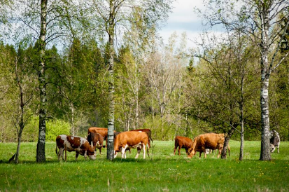
Area characterisation:
- This case study is taking a whole chain approach (production-processing-marketing) to market grass-fed organic beef in Estonia, an initiative by a farmer NGO Liivimaa Lihaveis (“beef of Livonia”– the only NGO of its kind). The NGO is closely related to a private company, Nordic Beef, whose main function is to market grass-fed beef and is responsible for the national grass-fed beef quality scheme (in which 30 farmers are involved).
- The main aim of this private initiative is to seek independence from conventional systems to give more added-value to farmers through controlling the whole supply chain. Liivimaa Lihaveis also promotes the consumption of grass-fed beef and the environmental benefits related to this, e.g. management of grasslands, including biodiversity-rich semi-natural grasslands.
- The total area of organically managed farmland of the 41 farms involved in the initiative across Estonia is about 13,900 ha, which corresponds to 7% of total area of managed semi-natural habitats in Estonia. The farms part of the quality scheme own in total about 8% of total number of Estonian beef cattle.
- The main environmental and social benefits studied are biodiversity, landscape character and cultural heritage, rural vitality and animal welfare.
Objective:
34 case studies were planned by the H2020 PEGASUS project in different farming and forest systems and along the supply chain in 10 EU countries, to:
- examine the issues faced in ensuring effective provision of public goods/ecosystem services from farming & forest activities; and
- find solutions to enable the economic social and environmental sustainability of the EU’s farmed & forest areas.
Financing:
No information
Potential impacts/benefits:
Management of permanent grasslands, especially semi-natural habitats is very important for maintaining biodiversity (species and habitats) and for protection of landscape character and cultural heritage. Liivimaa Lihaveis is providing marketing opportunities for producers and in-creasing the awareness of the consumers about benefits related to this kind of production and this allows participating producers to continue the agricultural production and stay in rural areas. Maintaining/increasing employment opportunities in the countryside is helping to pre-serve rural vitality. Preservation of grasslands is highly important also in terms of carbon stor-age.
Actions:
Responding to low prices in conventional supply chains, a group of Estonian organic beef farmers founded the
NGO Liivimaa Lihaveis and developed a quality scheme label to differentiate their grass-fed beef products on
the market. Progressively it grew to cover the whole supply chain, increasing added value to farmers.
Transferability of result:
Transferability factors:
- Shift in farmers’ mind-sets regarding the benefits that can arise from collective action, cooperation and bottom-up initiatives in enabling non-conventional systems of production to emerge.
- Changes in consumer behaviour and awareness with regards the origin and production methods of food products, and associated benefits.
- Presence and motivation of strong local leaders who are willing and able to start and develop such an approach.
- Availability and stability of publically funded support measures, especially in relation to agri-environment measures, organic farming, quality schemes, cooperation and promotion and marketing.
- The approach appears to be transferable to other sectors, contexts and countries and still has high potential to furthe rexpand in Estonia
- Preservation of semi-natural grassland habitats is highly supported by public policies in Estonia. The involvement of the private sector through the organic grass-fed label was found to provide, in this case, a more efficient and effective way to ensure their maintenance and enhancement.
Lessons learnt:
- Grass-fed organic beef production relies on grasslands, and provides related environmental and social benefits such as biodiversity, preservation of landscapes, rural vitality as well as benefits related to organic farming (e.g. soil functionality, water quality, animal welfare). Without valorisation of the production (in this case beef) the system might not be sustainable in long-term.
- Farmers use a combination of the private marketing initiative (controlling the whole supply chain and the labelling of products) and with various public funds (e.g. CAP Pillar 2) which makes this approach economically viable.
- This type of initiatives is highly dependent on the personal enthusiasm of some active people.
Organisations:
Centre for Ecological Engineering Tartu, Horizon 2020 PEGASUS project